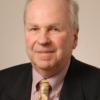Comedian Tony Hinchcliffe gestures during a rally for Republican presidential nominee and former U.S. President Donald Trump at Madison Square Garden in New York City Oct. 27. Hinchcliffe's routine included racist insults directed at Puerto Rico. (OSV News/Reuters/Andrew Kelly)
Donald Trump's dream of headlining a rally at Madison Square Garden came true this month. The fulfillment of that long-held desire, however, has turned into a political nightmare not only for his campaign but for the Catholic Church.
The Oct. 27 event began with comedian Tony Hinchcliffe's "joke" about Puerto Rico being "a floating island of garbage in the middle of the ocean." Hinchcliffe didn't stop there, making a crude sexual reference that was so offensive most news outlets refused to publish or reference it.
Not surprisingly, Trump declined to apologize, calling the evening a "love fest." The New York Times had a different description, characterizing the event as a "carnival of grievances, misogyny and racism."
Prominent Puerto Ricans have expressed their outrage, including Geraldo Rivera, Bad Bunny, Jennifer Lopez and Ricky Martin.
And Puerto Ricans who don't have the spotlight of celebrity status shining upon them have also expressed their anger. In Drexel Hill, Pennsylvania, Lillianne Rivera Caso described Hinchcliffe's disparaging remarks as "very Klan-like thinking [and] not something that should ever be portrayed in a presidential election.'
Among the first to speak on behalf of the Catholic Church was San Juan Archbishop Roberto González Nieves, who issued a statement on behalf of his Puerto Rican brother bishops: "Puerto Rico is not a floating island of garbage. Puerto Rico is a beautiful country inhabited by a beautiful and noble people." The "joke," he said, not only provoked "sinister laughter, but hatred."
Archbishop Roberto Gonzalez Nieves of San Juan, Puerto Rico called on Donald Trump to apologize for racist remarks directed at Puerto Rico that took place his Oct. 27 rally. (OSV News/Bob Roller)
Only a few Catholic leaders have joined Gonzalez in condemning Hinchcliffe's disparaging remarks. The Diocese of Youngstown, Ohio, issued a statement saying, "There is no room in the Church of Christ, nor the world, for hatred of ones' brothers and sisters, or for any malice to be held in one's heart against them." San Antonio's Archbishop Gustavo García-Siller described Hinchcliffe's remarks as demonstrating "a lack of maturity."
But the silence among many Catholic leaders is reminiscent of the decades of cover-ups and excuses when tens of thousands of children suffered from the sexual abuses perpetrated upon them by Catholic priests and other religious leaders.
The silence of New York's Cardinal Timothy Dolan is especially noteworthy. New York City has the highest proportion of Puerto Ricans in the United States, the majority of them Catholics and faithful church attendees. Yet, even now, days after Trump's rally, not a word from Dolan.
In the past, Dolan has boasted of his close relationship with Trump, calling him "a great gentleman" and a "great friend of mine," telling Trump in 2020 that he calls him more often than his 90-year-old mother in Missouri. Those comments stand juxtaposed to Trump's crude references to women, boasting in 2016 that he likes "grabbing them" and "forcibly kissing them."
During the COVID-19 pandemic, Dolan pleaded for funding to keep the diocese's Catholic schools open. In return, he received $1.4 billion in federal aid at Trump’'s direction. Maybe he has $1.4 billion reasons for keeping quiet now.
Dolan is not alone in keeping mum. Jack Jenkins, a Religion News Service reporter, tweeted that all the bishops in the U.S. Conference of Catholic Bishops he contacted to respond to Hinchcliffe's remarks either refused to answer or did not respond.
Cardinal Henry Edward Manning describes the sin of omission as leaving "undone the good or the duties to which we are bound by those obligations." Dolan and his brother bishops are princes of the Catholic Church. And with those mantles and shepherds' crooks comes a responsibility not only to do good but to defend the faithful when they are singled out as "the other" by political leaders.
Pope Benedict XVI reminded us that "recogniz[ing] the divine image in the other" is at the core of Jesus' message. Each person is created in God's image, an understanding St. John Paul II drew directly from the Bible. Jesus saw past the social conventions of his time to see the woman at the well, the woman being stoned for adultery, and the woman pleading for a healing from her menstrual bleeding. Jesus saw the hated Roman soldier and healed his servant upon command. Jesus saw the hated Roman tax collector, Matthew, and converted him. Jesus not only saw those people, He respected them, elevated them, and called them forth because God created and loves each of them. God was reflected in them, as God is reflected in the people of Puerto Rico he created, not the "garbage," depicted at Trump’s rally.
Acting on this idea, which is at "the very heart of Catholic social teaching," is an obligation for all Roman Catholics, especially their leaders. Archbishop Gonzalez met the moment. But sadly, too many other Catholic voices are silent.
This election is not just a test of who we are as Americans. It is also a test for all Catholics and, especially, the leaders of the church. Remaining silent while the politics of hatred and division persist is not an option. With the campaign nearly over, it is not too early to say that too many Catholic leaders have failed to meet it.
Advertisement








